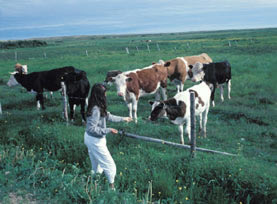|
In today's world, a large number of us humans have pets, and usually there is a feeling of fondness for our furry companions, our fine feathered friends, or even our scaly little lizardly loved ones. Many people also feel kinship with wild animals, whether its the squirrels and birds in the back yard, or the wolves, deer, bears, eagles, butterflies, and other critters in wilder habitats.
As a general proposition, many people would classify themselves as animal lovers. Others might not want to go as far as "animal lover" but would at least say that they like and respect animals. Admittedly, there are a few people who are the type that would put a bumpersticker on
 their vehicle that says "I brake for animals... so I can back up and take another run at them." But fortunately, macho cretins are relatively few in number.
their vehicle that says "I brake for animals... so I can back up and take another run at them." But fortunately, macho cretins are relatively few in number.
So, for those of us in the category of people that are animal lovers, or at least like and respect animals, we want to propose a simple thing we can do to improve conditions faced by animals in the wild or on the farm. Eat organic. That may sound like a non sequitur, but read on, and we'll explain why you should eat organic food to keep your animal-lover credentials in good form.
One thing we must say up front that there is no system of animal husbandry that is as kind to animals as vegetarianism (or, more properly, veganism), and we applaud those animal lovers that have made this choice. But we recognize that not everyone is ready to sign up for that, so, this article explores next best options.
Conventional farming uses two main types of chemicals: fertilizers and pesticides, with the latter including insecticides, herbicides, fungicides, and rodenticides. The pesticides and fertilizers are applied to farm fields to artificially boost yield and to compensate for poor attention to soil quality and a failure to use other techniques that can control pests naturally.
Unfortunately, farm chemicals applied to a farm field do not just stay there. Rainwater that runs off the fields carries the toxins with it, transferring the pollutants to nearby ponds, streams, lakes, rivers, and bays. Some agricultural pesticides also contribute to local air pollution—in California, pesticides are among the top three contributors to ozone pollution (smog) in the San Joaquin Valley, and account for nearly 10% of the hazardous ozone-forming gases produced in the larger Central Valley region. Rain can also precipitate out the airborne pesticides, again putting them into bodies of fresh water. State warnings of local fish contaminated with pesticides are the norm today, and runoff of fertilizers from farming operations are the number one cause of the life-choking coastal dead zones in estuaries and bays around the world.
The fish and animals that depend on streams, rivers, and lakes for habitat or drinking water are negatively impacted by the presence of potent pesticides in the water. Fish, shellfish, and other creatures in waterways that end up with low-oxygen dead zones due to fertilizer runoff are even more impacted. When you eat organic, you are no longer contributing to these problems, and your animal-lover conscience can be clear.
Conventional farms are "ecological sacrifice zones"—they are relatively sterile environments, lacking in any of the original vegetation and missing any sort of varied wildlife. This is an unfortunate—and unnecessary—state of affairs for our farm lands.
Organic farms are typically smaller and feature a wider variety of crops. This—and the fact that the soil on an organic farm is teeming with nutrient-giving organisms instead of sterile chemicals—means that organic farm land supports a much wider variety of wildlife, from the tiniest soil organisms to larger animals like field mice and birds. In the United Kingdom, the national Organic Action Plan states that organic farming is "better for wildlife, causes lower pollution from sprays, produces less carbon dioxide and less dangerous waste, has high animal welfare standards, and increases jobs in the countryside."
Various organic standards encourage farmers to let their livestock roam freely on pasture for at least some of their time. Ideally, the amount of time should be maximized to the extent that it maximizes the benefits to the animal.
We would love to be able to say that perfect animal husbandry is why animal lovers should buy organic meat, eggs, and dairy, but it's not quite that simple. In the US, for instance, the national organic standard specifies that animals must have "access" to the outdoors. Some organic farmers do indeed put their livestock on pasture for all or part of the year (to the extent practical). But in other cases, the farmer may
 simply have an access door in the barn and then leave it to the animals to find their way outside—or not. Such an arrangement is legal and "organic," but not the best solution for animal welfare.
simply have an access door in the barn and then leave it to the animals to find their way outside—or not. Such an arrangement is legal and "organic," but not the best solution for animal welfare.
One emerging problem in this area is that agribusiness has started developing large organic animal-agriculture operations, and they often use some of the same environmentally unsound—and animal-unfriendly—methods used by large, conventional animal-farming operations. Whether they are staying within the requirements of the governing organic standards is still under debate, but one thing that is fair to say is that smaller organic operations are much more likely to do the best job of ensuring animal welfare on the farm. It may take a little digging on your part, but choosing meat and dairy from a small, family-run organic farming operation is your best bet for ensuring the best treatment of farm animals. (Here's a hint: The biggest, best-known organic dairy label is probably not the most animal-friendly.)
In addition to "organic," you may sometimes see terms like "free range" and "grass fed." Such labels would appear to be helpful, but they typically have no standard definitions or requirements, and they're potentially open to abuse. The term "raised on pasture" is slightly more helpful, but it's still not backed up by enforceable rules. Still, it's better to find these labels when you buy organic meat, eggs, and dairy than to not find them, and they do make it more likely that the animal your food came from was treated as kindly as possible.
The problems associated with genetically modified (GM) foods as they relate to animals include:
- potential negative impacts on some wild species, including butterflies and birds, who come in contact with the pollen from GM crops or who nibble on the leaves and other parts;
- loss of the effectiveness of the natural pesticide Bt, which will eventually reduce the world's ability to grow food without chemical pesticides;
- the potential for genetically modified livestock animals to one day end up on your dinner plate.
In the US, you likely are already supporting the GM food industry with your purchases of non-organic products from the four main GM crop categories: corn, soybeans, cotton, and canola oil. Much of North America's annual yield of these crops is now from GM varieties. US beef and dairy cows are often fed GM corn and soybeans.
There's no way for you to know whether the food product you see on the grocery store shelf contains GMOs or not—agribusiness has been generally successful in their lobbying efforts to defeat requirements that GMO-containing food be labeled as such. But there is an easy way to end your support of genetically modified food crops—buy organic. The organic standard expressly prohibits the inclusion of GM foods.
So, we see that eating organic meat, eggs, and dairy is a better (though not necessarily perfect) choice for animal lovers. And because pesticide use is reduced, GMOs are eliminated, and "farm as habitat" is improved when we eat non-animal organic foodstuffs, maximizing the overall amount of organic food you eat (including fruits, vegetables, and processed foods) is a great choice.
|
Each of us has a different level of commitment as an animal lover. Changing our eating habits to organic and learning more about the people who are growing our food (and how they operate) will go a long way to reducing suffering in the animal world and will help buff up your credentials as an animal lover.
Please share this "why eat organic" article with your animal-lover friends. Send it.
Books:
|
|
Get Grinning Planet free via email
|


